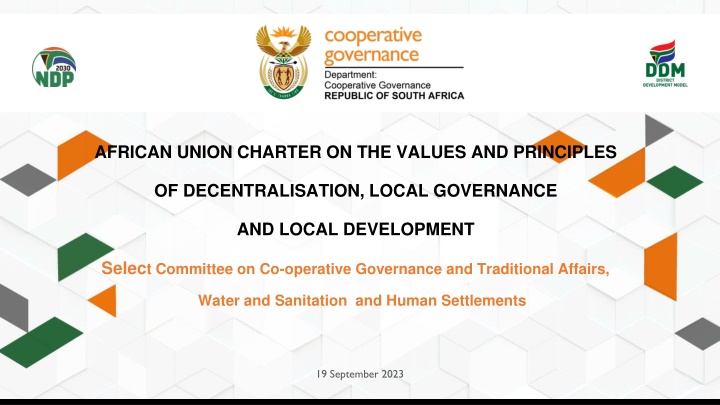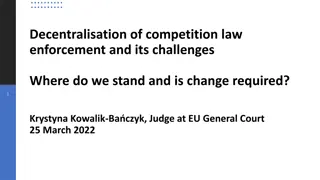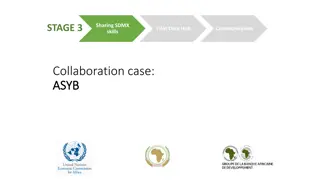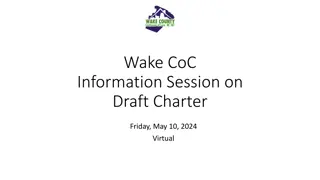African Union Charter on Decentralisation and Local Governance Summary
The African Union Charter on Decentralisation and Local Governance was adopted in June 2014 to provide a framework for decentralising powers within AU Member States. It aims to promote decentralisation, local governance, and local development by ratification through Parliament. Currently, 17 countries have signed the Charter, and 9 have ratified it. The Charter requires 15 ratifications to come into effect for all signatory states.
Download Presentation

Please find below an Image/Link to download the presentation.
The content on the website is provided AS IS for your information and personal use only. It may not be sold, licensed, or shared on other websites without obtaining consent from the author.If you encounter any issues during the download, it is possible that the publisher has removed the file from their server.
You are allowed to download the files provided on this website for personal or commercial use, subject to the condition that they are used lawfully. All files are the property of their respective owners.
The content on the website is provided AS IS for your information and personal use only. It may not be sold, licensed, or shared on other websites without obtaining consent from the author.
E N D
Presentation Transcript
AFRICAN UNION CHARTER ON THE VALUES AND PRINCIPLES OF DECENTRALISATION, LOCAL GOVERNANCE AND LOCAL DEVELOPMENT Select Committee on Co-operative Governance and Traditional Affairs, Water and Sanitation and Human Settlements 19 September 2023
OUTLINE Purpose Background on the Decentralisation Charter Articles of the Decentralisation Charter (1 to 26) Implementation plan of the Decentralisation Charter Recommendations 2
PURPOSE OF THE PRESENTATION To present the African Union Charter on the Values and Principles of Decentralisation, Local Governance and Local Development ( the Decentralisation Charter ) to the Select Committee responsible for COGTA; and To request the Select Committee responsible for COGTA to support the ratification of the Charter in terms of section 231(2) of the Constitution of the Republic of South Africa, 1996. 3
BACKGROUND ON DECENTRALISATION CHARTER African Union Heads of States convened and adopted the Decentralisation Charter in June 2014, in Malabo, Equatorial Guinea. Main purpose of the Decentralisation Charter is to provide a decentralisation framework to assist AU Member States in developing their constitutional and legislative prescripts on decentralising powers and functions from higher spheres/tiers of government to the regional and sub-regional arears within a country. In order for the adopted and signed Decentralisation Charter to bind the Republic, it requires ratification by Parliament, and subsequent depositing of the instrument with the Commissioner of the AU, once ratified. Honourable President of South Africa issued a President Minute providing full authorisation of signing powers to the Minister of Cooperative Governance and Traditional Affairs on behalf of the government of the Republic of South Africa, with the African Union representatives. Minister of Cooperative Governance and Traditional Affairs signed the Decentralisation Charter in August 2021 following the obtaining of legal opinions from the Offices of the Chief State Law Advisors of the Department of Justice and Constitutional Development, and the Department of International Relations and Cooperation that indicated the Decentralisation Charter is compliant with the Constitution Currently there are 17 (seventeen) countries that have already signed the Decentralisation Charter; and 9 (nine) countries have ratified and deposited the Charter at the African Union Headquarters, in Addis Ababa, Ethiopia. As soon as the 15thmember state has ratified and deposited such, the Decentralisation Charter will come into effect for all the signatory Member States. 4
ARTICLES OF THE DECENTRALISATION CHARTER SUMMARY: CHAPTERS OF THE DECENTRALISATION CHARTER Article 1 to 4 of Chapter 1: Provides for the definitions of Key Concepts, the Objectives, Scope and Core Values of the Charter: The Charter promotes, protect and act as a catalyst for decentralisation, local governance and local development in Africa; promote the core values and principles of decentralisation, local governance and local development Article 5: Chapter 2: Local Governance: States that state parties shall enact domestic laws/regulations, recognising different levels of government with the mandate to exercise their competencies through clearly defined regulatory mechanisms, geographical boundaries of areas falling within the jurisdiction of local governments or local authorities shall be modified in accordance with the provisions of the law. Article 6: Subsidiarity: States that national/central government shall create enabling conditions for decision-making, policy and programme initiation, adoption and implementation to take place at lower levels of government where local governments or local authorities offer a better guarantee of pertinence and efficacy. 5 DISTRICT DEVELOPMENT MODEL
ARTICLES OF THE DECENTRALISATION CHARTER SUMMARY: CHAPTERS OF THE DECENTRALISATION CHARTER Article 7: Resource Mobilisation and Local Economic Development: States that national/central governments shall adopt legislation, measures and establish relevant mechanisms to give local governments the authority to mobilise and disburse resources at the local level for local economic development. Article 8: Diversity and Differentiation: States that national/central and Local Governments or Local Authorities may establish consultative mechanisms, informed by local conditions to make proposals or give opinions concerning guidelines or decisions on local development. Article 9: Legality: States that local governments shall adopt by-laws, develop and implement local programmes, projects or initiatives in a manner consistent with national laws and regulations. 6 DISTRICT DEVELOPMENT MODEL
ARTICLES OF THE DECENTRALISATION CHARTER Article 10: Inclusion, Equity and Equality: States that local governments or local authorities shall discharge their responsibilities and duties in a manner that it is inclusive, equitable and gives equal treatment to all local residents to ensure that citizens and local residents have equitable access to quality services. Article 11: Shared Responsibility and Complementarity: States that local governments or local authorities promote and improve the livelihoods and environment of local communities. Article 12: Participation: States that national legislation shall guarantee the rights and outline responsibilities of citizens to participate in public life at the local level. 7 DISTRICT DEVELOPMENT MODEL
ARTICLES OF THE DECENTRALISATION CHARTER Article 13: Representation: States that central governments shall establish innovative measures and appropriate mechanisms to ensure the full participation of all eligible citizens including specific measures for the representation of women and marginalised groups in local government elections within the framework of national legislation. Article 14: Transparency, Accountability and Ethical Behaviour: States that measures for the promotion of transparency and accountability by local governments or local authorities shall be clearly outlined in national legislation. Article 15: Mainstreaming Gender, Youth and Disability: States that local governments or local authorities shall integrate gender, youth and disability issues in the overall process of formulating policy, planning development and providing services. 8 DISTRICT DEVELOPMENT MODEL
ARTICLES OF THE DECENTRALISATION CHARTER Article 16: Efficiency: States that national legislation shall be adopted to empower local governments to determine and manage the organization of local public administration within a common national framework of standards. Article 17: Solidarity, Cooperation and Partnership: Local governments or local authorities may enter into appropriate partnerships with non-African local governments to promote cooperation, especially South South cooperation. Article 18: Chapter 3: Follow-up Mechanisms: Commit to create favourable conditions for dissemination. 9 DISTRICT DEVELOPMENT MODEL
ARTICLES OF THE DECENTRALISATION CHARTER Article 19: Reporting: states that state Parties shall, from the date the Charter comes into force, submit to the Commission, every three years, a Report to the Commission on the legislative or other measures taken with a view to giving effect to the principles and commitments of this Charter. Article 20: Recognition, Award System and Commemoration: The Commission shall promote innovative experiences and institute a system of awards for innovation in decentralisation, local governance and local development. Article: 21-26: Chapter 4: Final Clauses on safeguard provisions; settlement of disputes; signature, ratification or accession; entry into force; amendment, and depository. Provisions of Charter shall not be interpreted in a manner that is inconsistent with the relevant principles of international law, including international customary law. Any dispute relating to this Charter shall be amicably resolved through direct negotiations between the State Parties concerned. 10 DISTRICT DEVELOPMENT MODEL
IMPLEMENTATION PLAN OF THE DECENTRALISATION CHARTER The Implementation plan is guided by Chapter 3 of the Decentralised Charter: Implementation at individual State Party level: o Local government level: requires that local government shall equally be responsible and accountable to their local population for the implementation of the objectives of this Chapter, and adherence to its values/principles. o National government level: State Parties adopt legislative, executive and administrative measures to align national laws and regulations to the objectives of this Charter and adhere to the values/principles. Implementation at Commission level: o Regional level: amongst others, that in accordance with their constitutive instruments, regional economies shall encourage Member States to ratify, accede, implement and monitor the Charter. o Continental level: to ensure and facilitate the implementation of this Charter, the Commission shall develop guidelines for the implementation of this Charter. 11
RECOMMENDATIONS It is recommended that the Select Committee responsible for COGTA o Notes the African Union Charter on the Values and Principles of Decentralisation, Local Governance and Local Development that seeks to provide a framework on the decentralisation of powers and functions from national governments to other spheres of governments across the continent; o Supports the ratification of the Decentralisation Charter in terms of section 231(2) of the Constitution of the Republic of South Africa, 1996. 12
Our Vision: An efficient & effective cooperative governance system that enables resilient, safe, sustainable, prosperous, cohesive, connected and climate smart communities Our Mission: To lead the Cooperative Governance System in support of integrated planning and implementation across all spheres of government 13























